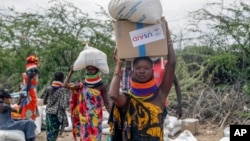The United Nations Office for West Africa and the Sahel, or UNOWAS, is a United Nations political mission in Dakar, Senegal established in 2002 for diplomacy and political mediation in West Africa and the Sahel.
Given the immense challenges faced by the people of West Africa and the Sahel, UNOWAS remains critical, said U.S. Ambassador to the United Nations Linda Thomas-Greenfield.
One of those challenges is terrorism, she said.
“Governments are struggling to reclaim control over territory and are witnessing record levels of violence. And leaders who engage in heavy-handed counterterrorism tactics, while neglecting to address the drivers of marginalization, are only making the security situation worse. The security threat is further spreading into Coastal West Africa, as we see with recurrent attacks in Benin and Togo, and in the continual increase in displacement.”
According to UN reports, the Lake Chad basin has also experienced an uptick in attacks and abductions in northeastern Nigeria.
Despite the terrorist threat, many examples of democracy remain in West Africa and the Sahel, said Ambassador Thomas-Greenfield.
“We applaud Liberia’s and Senegal’s democratic transfer of power following elections this year and congratulate Ghana on its recent presidential and parliamentary elections.”
However, there are also clear signs of backsliding across the region, especially in countries shrinking their political and civic space by banning protests; arresting journalists and other civil society advocates; and curtailing freedom of expression.
“Leaders must reverse these deeply troubling trends. Human rights and freedoms must be respected,” said Ambassador Thomas-Greenfield.
Across the region, millions of people are in need of humanitarian assistance and protection, including more than 25 million people in Burkina Faso, Mali, Niger, and Nigeria. And across the region, nearly 33 million people are food insecure, warned Ambassador Thomas-Greenfield:
“The scale of displacement, according to [UN High Commissioner for Refugees], has also dramatically increased. The United States is the largest single humanitarian donor in Africa, having provided more than $6.7 billion dollars in humanitarian assistance across the continent in 2024. But this is not enough, and we can’t do it alone. We, as the international community, need to do more.”
“None of this work will be easy,” said Ambassador Thomas-Greenfield, “but we must not waver in our resolve.”






